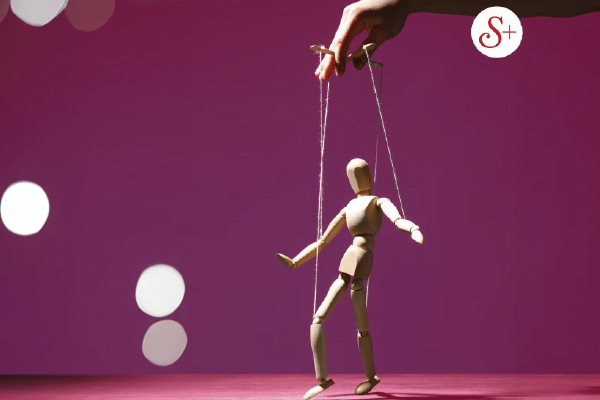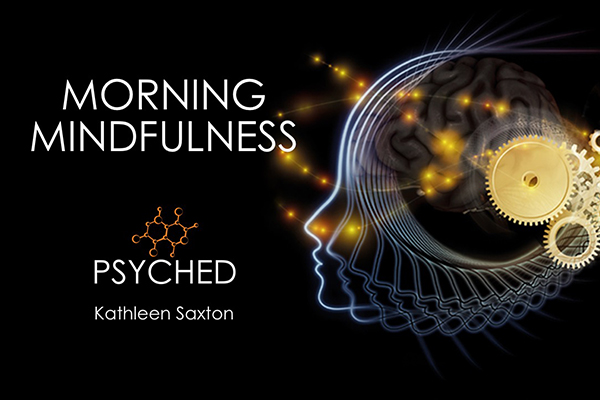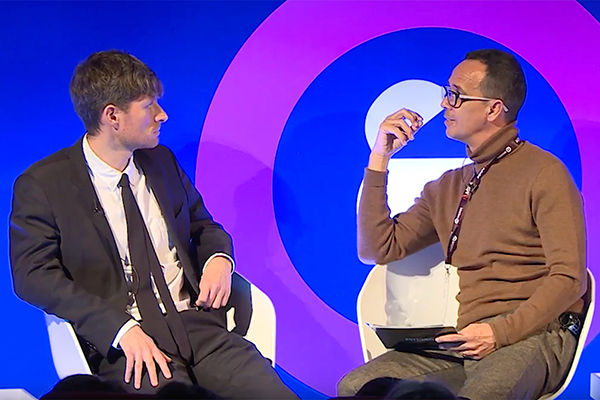Those with narcissistic personality disorder can have a devastating impact on the people around them – but what’s their most damaging behaviour? The silent treatment, according to psychotherapist Kathleen Saxton. Here, she explains how to spot it when you see it and how to broach the subject successfully with the silencer.
Imagine it’s one of the most important days of your year. A work awards ceremony, say, or a big family event, and you’re bringing your partner. After the first 30 minutes, you notice they’re no longer responding to you. Throughout the evening, they stonewall your attempts to make conversation and won’t even return your gaze. You enquire, you comfort, you cajole – until, eventually, you scold. Why are they behaving like this? Later that evening, your partner sleeps as far away from you in the bed as possible and the following morning leaves your place without a word. You don’t hear from them again for a week, leaving you bereft and wondering what went wrong.
This phenomenon, known as ‘the silent treatment’, is frequently present in the work that psychotherapists – myself included – undertake with victims and survivors of narcissistic abuse. To be clear: I’m not talking about purposefully and healthily taking time out to cool down during a heated discussion or attending to feelings of short-term overwhelm or dysregulation, but rather chronic and repetitive use of the silent treatment as a manipulation within a relationship to assert control and deliver punishment. It also means the relationship is robbed of the opportunity for ‘rupture and repair’ – the healthy cycle of any conflict – leaving the abandoned partner in a permanent state of rupture. This can cause devastation to any relationship – professional or personal.
The criteria for being diagnosed with narcissistic personality disorder ranges from a lack of empathy to being preoccupied with fantasies of success and power. Still, it remains a largely misunderstood issue, with pop psychology (eg 30-second TikTok videos) often diluting the true devastation this mental health disorder has both on the narcissist and those around them. It’s estimated that around 5% of the population demonstrate clear narcissistic traits, with 0.5%-1% formally diagnosed, but psychotherapists are certain there is a growing number of undiagnosed individuals who would reach the criteria for formal diagnosis.
“At the core of this destructive disorder is a ‘false self ”
There are many ways a narcissist can negatively impact those around them, but their love of the silent treatment is perhaps most insidious of all. From walking out mid-argument with no sense of when they’ll return to simply refusing to talk at the dinner table or blocking you on social media, this behaviour is intended to control those around them. It often co-exists with gaslighting – when the narcissist finally comes around, they’re likely to pretend that nothing ever happened. All these behaviours trigger a sense of fear, confusion and abandonment from the person they’re aimed at, with no ability to repair things until the silencer is willing to return to the discussion.
I was recently collaborating with a woman who had attended her father’s funeral alone, because her narcissistic fiance had instigated a regular episode of the silent treatment the day after her father passed away. Ironically, she had raised his lack of support towards her as her father deteriorated in hospital, and as a result of her challenging him and reaching for his emotional support, he subsequently and immediately refused to speak to her for the following four weeks, including the days before, during and after the funeral, despite the fact they were engaged to be married some months later. She was beside herself with pain and disbelief. The cognitive dissonance within her wondering how her own partner could force her to endure her father’s death and funeral all alone was understandably beyond her and most people’s comprehension.
While you might think it would have signalled the end of that relationship, her understandable need to have some semblance of emotional support during her grief meant she took him back. Such is the pattern and sadness for the victims of narcissistic abuse – a partner’s self-esteem can become so worn down by the ongoing impact of the narcissist, they often stay in the toxic relationship.
But why is this a narcissist’s go-to punishment? Voicing a concern, challenging a delusion or asking for a need to be met by a narcissist can trigger the resentment and inner shame held by those who suffer from this disorder. This is because at the core of this destructive disorder is a ‘false self’ – a mask the narcissist creates as their protection from the painful feelings they hold due to emptiness and lack of self-worth. Anyone who highlights a shortcoming in the narcissist – whether behavioural, intellectual or emotional – wounds them so deeply that they will do whatever it takes to dodge or destroy them.
And so, the silent treatment is an effective way to both avoid the conversation but also deter the partner from challenging them in the future. Naturally, being ostracised and ignored can be a deeply confusing and painful experience, so it makes sense we learn to avoid acting in ways that means we’ll be treated this way.
The effect this has on us emotionally should not be understated. According to research by Prof Kip Williams, a leading expert in the effects of social exclusion from Purdue University, the sensory parts of the brain that recognise physical pain are also activated by the experience of the silent treatment (something he discovered while performing MRIs on patients involved in experiencing it). Not only that, the silent treatment activates the body’s stress response system, leading to the release of stress hormones such as cortisol. Chronic exposure to such stressors can have detrimental effects on both physical and mental health, contributing to a range of issues including anxiety, depression and a compromised immune function, which can lead to the victim desperately seeking ways to reconnect with the perpetrator in order to seek comfort.
“Avoiding accusations and attacks is key”
Narcissists exploit this cycle to maintain dominance and control. By withholding communication and affection, they reinforce their superiority and instil a fear of further abandonment in their partners, thereby perpetuating a cycle of emotional manipulation and dependence.
If you recognise this cycle of behaviour in a relationship in your life, it may be time to examine what you are willing to do to break the cycle of abuse. One technique I often recommend to clients is addressing the issues with the silent individual through ‘I-based’ statements. Such as: ‘I notice you have shut down again, and I feel very alone when you do that’ or ‘I am wondering if there may be a way we can restart from a new place.’
Avoiding accusations, heated discussions or attacks is key – but it’s still important to voice how you feel. The harsh truth is that they already know this is unacceptable behaviour, but offering them a chance to truly understand how you feel may offer a glimmer of hope; ideally, they would contact an expert (such as a psychotherapist) to help them unravel why they adopt such strategies. There is, for example, a probability they were brought up in a family or social constellation that modelled this unhealthy behaviour – but they still have a choice as to whether they want to perpetuate this cycle.
Fundamentally, relationships can only be successful if both parties are to accept their part and gain insight into their behaviour. Behavioural patterns (like the silent treatment) can also offer us clues as to whether we are dealing with a circumstance (is it unique to this relationship?) or if, in fact, this behaviour follows them. Keep a note of how often and for how long these episodes last – you may surprise yourself with what you have slowly become used to. I’d recommend seeking support from a counsellor to help you navigate this.
Ultimately, we all deserve to be loved, seen and understood, including you.
Stylist, April 2024








